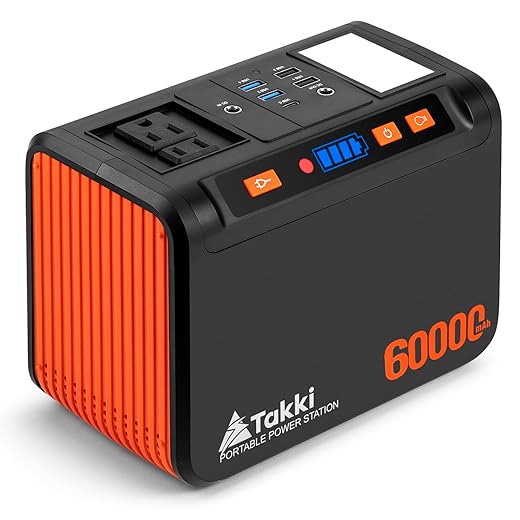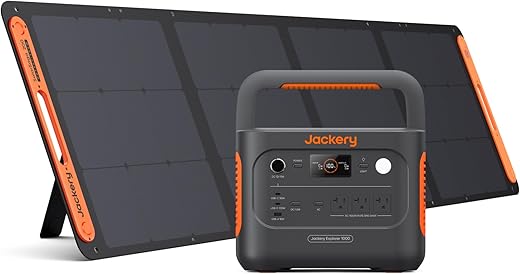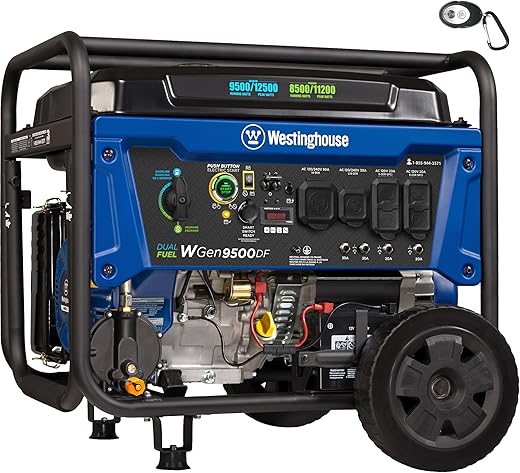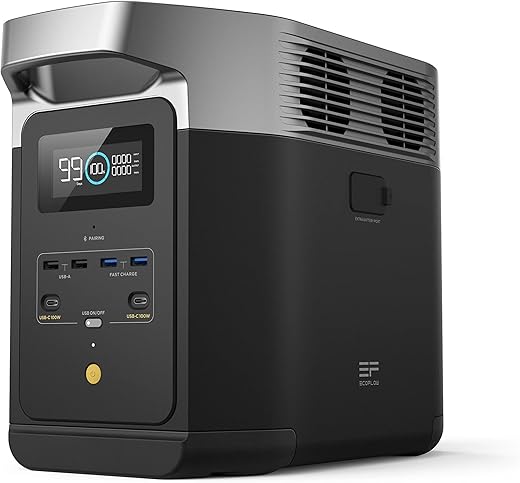In the realm of portable power solutions, the ‘Jackery Solar Generator’ and ‘Takki Solar Generator’ represent two distinct approaches to harnessing solar energy for outdoor adventures and emergency situations. As I explore the features, performance, and usability of these two products, I aim to provide a clear comparison that highlights their strengths and weaknesses. By analyzing key aspects such as capacity, efficiency, and user experience, I hope to offer insights that will assist potential users in making an informed decision based on their specific needs.
Outdoor Adventures
The Jackery Solar Generator 1000 v2, equipped with a 200W solar panel, delivers an impressive 1,070Wh capacity with ultra-fast charging capabilities—reaching full power in just 1 hour. With a powerful 1,500W AC output and versatile charging options, it is designed for outdoor adventures, off-grid living, and emergency situations, making it a reliable and eco-friendly power solution.
Outdoor Adventures
The Takki 120W Peak Solar Generator combines a high-capacity 88.8Wh power station with a 21W solar panel, making it an ideal portable solution for outdoor activities and emergency situations. With multiple output options and efficient solar charging capabilities, it ensures reliable power for devices like laptops and lights during camping trips or power outages.
Jackery Solar Generator
Battery Capacity
1070Wh (equivalent to 300,000mAh)
AC Output Power
1500W (3000W surge)
Solar Panel Output
200W solar panel with 400W input capability
Weight
23.8 lbs
Charging Speed
1 hour fast charging
Takki Solar Generator
Battery Capacity
88.8Wh (equivalent to 24,000mAh)
AC Output Power
80W
Solar Panel Output
21W solar panel
Weight
2.29 lbs
Charging Speed
Charging time varies, no specific fast charging feature
Jackery Solar Generator
Takki Solar Generator
Jackery Solar Generator
Takki Solar Generator
Feature comparison chart


Unique Selling Points (USPs)
Jackery Solar Generator 1000 v2:
- High-capacity 1070Wh LiFePO4 battery ensures long-lasting power.
- Fast charging capability allows for full recharge in just one hour.
- Multiple output options including a powerful 1500W AC inverter.
- Robust design suitable for outdoor and off-grid applications, ideal for RV use.
Takki 120W Peak Solar Generator:
- Compact and lightweight design makes it extremely portable for quick trips.
- 88Wh capacity sufficient for charging small devices and emergency needs.
- User-friendly with multiple USB charging options, perfect for laptops and small appliances.
- Affordable and practical for short outdoor adventures or as a backup power bank.
Pros and Cons
Jackery Solar Generator 1000 v2
- Pros:
- Large capacity suitable for multiple devices.
- Fast charging reduces downtime.
- Versatile for various environments, including RV living.
- Cons:
- Heavier than portable options.
- Higher price point may not be budget-friendly.
Takki 120W Peak Solar Generator
- Pros:
- Extremely lightweight and easy to carry.
- Affordable and budget-friendly.
- Adequate for basic outdoor needs and emergencies.
- Cons:
- Limited power output; not suitable for larger devices.
- Smaller battery capacity means less run time.
Use Cases
Jackery Solar Generator 1000 v2:
- Ideal for extended camping trips where multiple devices need to be powered.
- Perfect for RV setups requiring substantial power capacity.
- Excellent option for emergency home backup.
Takki 120W Peak Solar Generator:
- Great for short camping trips where light electronics are necessary.
- Convenient for charging laptops or smartphones during outdoor adventures.
- Useful as an emergency power bank for small devices at home or in vehicles.
Conclusive Assessment
Based on the comparison, the Jackery Solar Generator 1000 v2 emerges as the more versatile and powerful option, providing greater capacity and rapid charging capabilities. However, the Takki 120W Peak Solar Generator holds its ground as an ultra-portable and budget-friendly alternative, particularly well-suited for basic outdoor activities.
Final Summary
In summary, the Jackery Solar Generator 1000 v2 is recommended for users who require a high-capacity power source with versatile output options for camping, RV use, or as a home emergency backup. On the other hand, the Takki 120W Peak Solar Generator is a great choice if portability and budget are a priority, ideal for short camping trips and light device charging. Ultimately, the decision hinges on specific user needs: opt for Jackery for power and capacity, or Takki for convenience and affordability.
Exploring Diverse Solar Generator Solutions
Guidelines for Comparing Solar Generators
When evaluating solar generators, it is crucial to have a structured approach to ensure that you make informed decisions based on your specific needs and requirements. Below are general guidelines and key factors to consider when comparing products in the solar generator category, such as the Jackery Solar Generator and the Takki Solar Generator.
Key Factors to Consider
1. Power Output and Capacity
- Wattage: Check the continuous and peak wattage. Higher wattage enables powering more devices.
- Battery Capacity: Measured in watt-hours (Wh), a larger capacity allows for longer use without recharging.
2. Solar Input and Charging Speed
- Solar Panel Compatibility: Ensure the generator is compatible with various solar panel brands and ratings.
- Charging Time: Look for the time it takes to fully charge the unit, whether through solar, AC, or car inputs.
3. Portability and Design
- Weight: Consider the weight if you need to transport the generator frequently.
- Dimensions: Look for a compact design that fits your storage needs.
4. Durability and Build Quality
- Materials Used: Higher quality materials will enhance longevity and performance under different weather conditions.
- Water and Dust Resistance: Look for ratings like IPX to understand resistance to elements.
5. Output Options
- Type and Number of Ports: Evaluate the variety of outputs, including AC, DC, USB ports, and their respective number.
- Inverter Type: Pure sine wave inverters are preferred for sensitive electronics.
6. Price and Warranty
- Cost: Compare the price relative to features and capacity. High-end models often offer better features, but ensure you assess the value.
- Warranty Options: A longer warranty can signify reliability and offer peace of mind.
Critical Details and Benefits
Storage and Performance
- Battery Chemistry: Lithium-ion batteries offer higher efficiency and longer lifespans compared to lead-acid batteries.
- Cycle Life: Consider how many charge cycles the battery can handle before performance degrades.
User-Friendliness
- Controls and Display: Check for intuitive controls and an easy-to-read display for monitoring usage and charging status.
- Mobile App Integration: Some models offer smart features that can enhance usability.
Environment-Friendly Aspects
- Sustainability: Using solar energy minimizes carbon footprint.
- Eco-Friendly Certifications: Products with certifications indicate adherence to environmental standards.
Customer Support and Reviews
- Customer Service: Assess the availability and responsiveness of customer support.
- User Reviews and Ratings: Research feedback from other users to better gauge reliability and performance.
Essential Questions About Solar Generators
The key features of Jackery solar generators, specifically the Jackery Solar Generator 1000 v2 and the Takki 120W Peak Solar Generator, can be summarized as follows:
- Battery Capacity: The Jackery Solar Generator 1000 v2 boasts a substantial 1070Wh capacity with a LiFePO4 battery, ensuring reliable power supply for various applications such as outdoor activities, RV trips, and emergencies. In contrast, the Takki solar generator offers a smaller capacity of 88Wh, suitable for lighter loads during camping or outdoor scenarios.
- Solar Panel Compatibility: The Jackery generator includes a 200W solar panel, allowing for efficient charging using renewable energy. This model supports the integration of solar power to recharge the unit in a sustainable manner. The Takki model also features solar capability with its 21W solar panels, although at a reduced charging capacity, making it more portable but less powerful.
- Output Options: The Jackery Solar Generator 1000 v2 provides a diverse range of output ports, including 1500W AC, USB-C, and USB-A outputs, accommodating multiple devices simultaneously. This versatility makes it ideal for powering everything from small electronics to larger appliances. The Takki generator includes AC, DC, and USB ports, making it suited for charging essentials like laptops and phones, although with a lower maximum output.
- Charging Speed: The Jackery model supports a fast charging feature, capable of reaching a full charge in just one hour under optimal conditions. This rapid recharging capability is a significant advantage for users requiring quick access to power. The Takki generator, while functional, may not offer the same rapid charging times due to its smaller battery capacity.
- Portability and Design: Both models are designed with portability in mind. The Jackery Solar Generator 1000 v2 is designed for ease of transport, making it suitable for outdoor adventures or emergency situations. The Takki generator emphasizes compactness and lightweight design, which is beneficial for campers and those seeking a more easily manageable power source.
- Applications: The Jackery Solar Generator is well-suited for off-grid living, emergency power needs, and extensive outdoor use due to its high capacity and output versatility. The Takki solar generator is ideal for lightweight outdoor activities and short-term use, such as camping trips, where smaller devices need power.
In summary, the Jackery Solar Generator 1000 v2 offers a higher capacity and faster charging options, while the Takki 120W Peak Solar Generator serves as a more portable solution for lighter, everyday outdoor power needs.










I’m all about that solar power life! Super excited to see how these two stack up.
Jackery has such a solid reputation! I’ve had mine for 2 years and it’s still going strong!
Great article! I love how you broke everything down. Makes it easier to choose!
I’ve seen more reviews on Jackery lately. Are people sleeping on Takki?
Price-wise, which one do you think gives the best bang for your buck?
Honestly, both have their pros and cons. It really depends on what you need it for!
I’ve been eyeing both these brands! Can’t decide which one to go for. Any tips?
Portability is key for me. Can anyone say which one is lighter?
Takki looks great too! Is it worth the switch from Jackery?